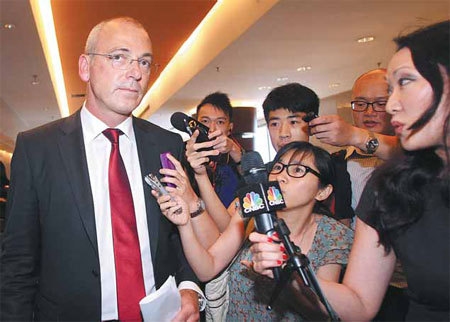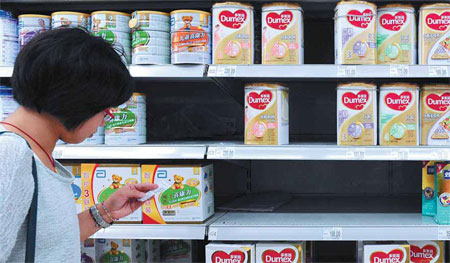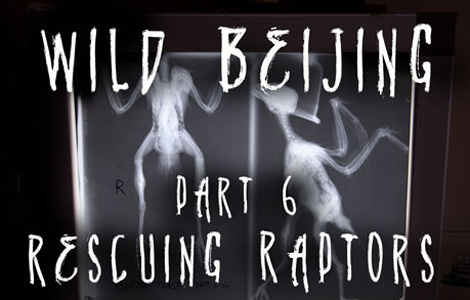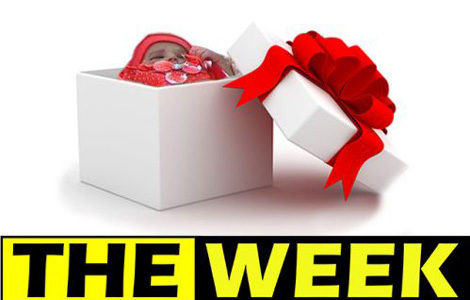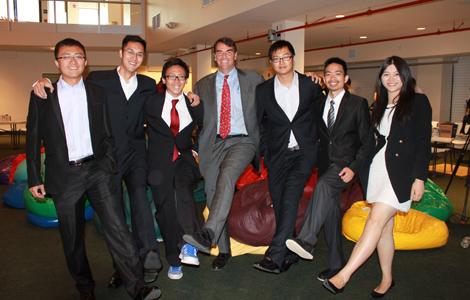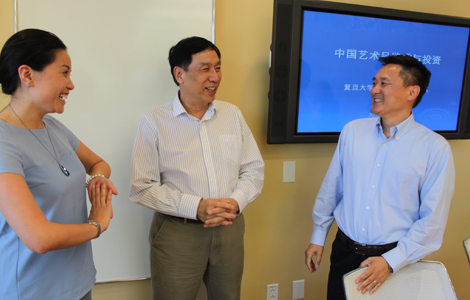Fonterra says sorry for 'anxiety'
Updated: 2013-08-06 07:12
By Wang Shanshan and Jiang Xueqing in Beijing, and Zhou Wenting in Shanghai (China Daily)
|
||||||||
|
Journalists don't want to let Theo Spierings go after the CEO of New Zealand dairy giant Fonterra held a news conference on its contaminated whey protein concentrate on Monday in Beijing. Chinese producers using the raw materials are recalling affected products. Zou Hong / China Daily |
|
A woman checks prices beside a shelf of Dumex baby formula at a store in Yichang, in central China's Hubei province. Many shops in Beijing and Shanghai take the product off the shelves. AFP |

Sales of affected products have taken a beating, report Wang Shanshan and Jiang Xueqing in Beijing, and Zhou Wenting in Shanghai.
Fonterra Cooperative Group, the New Zealand-based company at the center of a milk powder safety scare, apologized on Monday and pledged that all the contaminated material would be brought under control within 48 hours.
"We really regret the distress and anxiety which this issue could have caused," said Fonterra CEO Theo Spierings at a media briefing in Beijing. "We totally understand there is concern by parents and other consumers around the world. Parents have the right to know that infant nutrition and other dairy products are harmless and safe."
Alarm bells started ringing on the weekend when Fonterra announced that tests conducted on July 31 had discovered the bacterium Clostridium botulinum in whey protein concentrate manufactured at its Hauptau plant in Waikato in May. Food manufacturers use the whey protein as a raw material in baby formula and sports drinks.
The bacterium can severely damage, and even destroy, the nervous system if ingested and can also trigger neural paralysis in infants under 12 months.
However, the name of one of the companies that used the contaminated whey protein in its infant nutrition products remains unknown after the New Zealand-based dairy giant declined to identify the manufacturer concerned.
Spierings said he was complying with the wishes of the company, which had requested not to be named. However, he insisted that the affected products are already under control.
"One of the customers asked us not to mention its name, but we are in contact with them," said Spierings, who wouldn't say whether the company is Chinese or based overseas.
Companies known to have used the contaminated whey protein include Dumex Baby Food Co, a subsidiary of Danone Group, China's largest beverage producer Hangzhou Wahaha Health Food Co and Hangzhou Wahaha Import and Export Co, and Coca-Cola Shanghai, which obtained the product from a local supplier, according to the China Food and Drug Administration.
"We are working closely with Danone in order to be fully transparent. Dumex has reported a total of 12 batches of products that may contain the bacteria. Half of the products are still in the warehouse, while the other half has been recalled," Spierings said.
More than 420 metric tons of Dumex baby formula produced with the tainted concentrate have been sold to consumers, according to the Shanghai Bureau of Quality and Technical Supervision.
Beverages produced with the tainted whey protein are safe to drink, Spierings said.
"We've confirmed with the beverage clients that the bacteria cannot survive the heat treatment of the production process. Those companies products are clear," Spierings said.
On Sunday, the nation's top quality watchdog, the General Administration of Quality Supervision, Inspection and Quarantine of the People's Republic of China, asked the companies to recall all the products involved.
Wahaha has produced a list of products made with the whey and said they have been almost sold out since October, but that no bacteria have been found in the end products.
Coca-Cola said it produced 19,000 crates of beverage using the contaminated protein on March 5. The drinks were transported to the Guangxi Zhuang autonomous region, and the provinces of Yunnan and Guangdong, but are now being recalled, according to reports on China Central Television.
Spierings said that no cases of illness have been reported so far, and Fonterra has not received any complaints.
China has now halted the import of all milk powder from New Zealand, according to Reuters, which cited New Zealand's trade minister, Tim Groser.
The New Zealand dollar dropped to its lowest level in a year against its US counterpart on Monday. In contrast, Chinese dairy companies reported a rise in their share prices: for example, Royal Dairy Co, based in Guangxi Zhuang autonomous region, surged 7.32 percent and closed at 14.52 yuan ($2.37).
Consumer confidence in foreign-branded formulas has declined sharply in the wake of the news, and some industry professionals say that may provide opportunities for domestic producers to move in on the market.
According to milk industry expert Wang Dingmian, foreign brands hold a share of almost 60 percent of China's baby formula market. In the first half of this year, China imported 445,000 metric tons of raw milk powder, with approximately 80 percent coming from New Zealand. Fonterra supplied 70 percent of the raw milk powder imported from New Zealand over the same period. China is New Zealand's largest trading partner.
Consumers said the incident has attracted wide attention because most of the products involved are stage 2 infant formula, which is in high demand in China.
"Many young mothers in China stop breastfeeding their children when they are around 12 months old and opt for stage 2 baby formulas," said Feng Yanyun, a Shanghai resident who has a 2-year-old son.
Taken off the shelves
Retailers were quick to move to counter the threat. Carrefour China ordered the removal of questionable batches of Dumex infant formulas from the shelves of its more than 100 Chinese mainland stores on Monday.
"Some of the products on the shelves belonged to the 12 batches. They have now been removed," said a spokesman for Carrefour in Shanghai who would only give his surname, Ji.
However, he said Carrefour had not received notices ordering Wahaha or Coca-Cola products off the shelves, or any recall notices from the suppliers.
"We'll keep in close touch with the municipal quality and market watchdogs and take measures according to their instructions," said Ji.
Wu Aiqin, a sales clerk at an E-mart store in Shanghai's Huangpu district, said relevant batches of Dumex milk powder were removed from the shelves on Monday.
However, Dumex infant formulas were still on sale at a Wal-Mart on Lujiabang Road, where they occupied more than one-third of the available shelf space for infant formulas.
"We have not received any notice to withdraw Dumex products," said the salesclerk, who gave her surname as Zhao. Although the products were produced in May and June, they do not belong to the 12 questionable batches.
Dumex formulas were also on sale at an outlet of Mogobaby, a chain store that specializes in maternity and baby products, located in Shanghai's Songjiang district, according to a sales clerk who only gave her surname as Zhao.
"If customers bought the Dumex products with the batch numbers detailed in the company's statement, they can bring them to our stores for exchange or return them for a full refund," she said.
Many store managers on Taobao, China's leading e-commerce platform, who provide infant formulas purchased overseas, said their business has been affected by the scare.
"The sales volume slumped yesterday and today after the news about Fonterra exploded. On average, I sell 650 tins of Dumex Stage 2 every month. Yesterday I sold just six and today I haven't sold any," said a store manager, who asked to be identified simply as Barbara, on Monday.
Business was also affected at online stores selling Karicare baby formulas, after the Australia-based baby formula maker Nutricia, also a Danone subsidiary, recalled three batches of its Karicare infant formula from the New Zealand market.
Karicare is a leading baby formula producer in New Zealand, boasting 72 percent of the market share in the country, according to its official website.
The products recalled in New Zealand are: Infant Formula Stage 1 (0-6 months) with the batch numbers 3169 and 3170, and Kariare Gold+ Follow On Formula Stage 2 (6-12 months) with the batch number D3183.
China's quarantine authorities said the three batches have not been imported to China through normal trade channels, but warned consumers to check the batch numbers if they have recently brought any of the formula from New Zealand or bought the products through unauthorized channels online.
China's top quality watchdog issued a notice early on Monday morning, advising parents not to feed infants Karicare Stage 1 and 2 products to minimize risks.
"Nearly 100 customers had spoken to me by noontime today. All of them were asking about the safety of our products, and no one bought any," said a store manager on the taobao platform.
"Although I insisted the products in my store don't belong to those problematic batches, and even attached photos of the batch numbers on the bottom of the tins, I can't win the trust of the consumers," she said.
The Shanghai-based online store has an average monthly sales volume of more than 200 tins of Karicare products, but didn't sell a single tin on Sunday or Monday.
Food industry failings
Although, confidence in foreign-branded infant formulas has been shaken, many Chinese are still hesitant about turning to domestic brands.
Fan Hua, an associate in the Beijing office of a US law firm, chose Enfamil, an infant formula brand made by Mead Johnson & Co of the US, for his 9-month-old boy.
"I will pay more attention to the sources and testing results of imported baby formulas before making a purchase, rather than taking it for granted that foreign brands are safe. But the scandal will not affect my decision to buy imported formula milk," he said.
Like many Chinese consumers, Fan has lost confidence in domestic dairy brands because of concerns over food safety. Government supervision over food industry has yet to be improved in China, while nongovernmental organizations do not have the ability to blow the whistle on potential problems, he said.
The industry's failings have prompted many parents to buy foreign infant formulas, but consumers are still wary. "The latest scandal will not change foreign brands' monopoly of the market," said Wang Dingmian.
China's dairy industry has suffered a crisis of confidence since 2008, when Sanlu Group was found to have added the toxic chemical melamine, often used in the production of plastics, to its milk powder to boost its apparent protein content.
This year, some major companies have attempted to rebuild consumer confidence and boost their presence in the domestic dairy industry through mergers and restructuring.
In June, China Mengniu Dairy Co Ltd, one of the largest dairy enterprises in the country, paid $1.6 billion to acquire a 75 percent stake in the domestic baby formula maker Yashili International Holdings Ltd. In July, a major competitor, Inner Mongolia Yili Industrial Group Co Ltd, signed a strategic cooperation agreement with Dairy Farmers of America.
However, some industry experts argue it's wrong to believe that dairy companies will improve their brand image and reduce safety problems by increasing in size.
"Our dairy companies are not capable of running a large enterprise. Because the management is not up to the job, mergers and acquisitions will become a heavy burden for them and increase their risks," said Wang.
Fan also noted that Chinese dairy companies are unlikely to become more trustworthy by acquiring, or merging with, a foreign counterpart. "Their future depends on whether or not the Chinese companies allow their foreign partner independence in decision-making, management and product inspection. Otherwise, they will only ruin the foreign brand through a merger or acquisition," he said.
Chinese dairy enterprises have failed to take effective measures to regain consumer confidence, said Fan. He suggested the companies make the results of inspections by reliable third parties publicly available. They could also improve formula and help it to meet the nutritional needs of infants by modeling it on the nutritional composition of breast milk.
"Chinese dairy companies and the government should be more transparent in keeping the public informed about inspection measures, procedures and test results of dairy products. For example, they should release information on the sources and quality of milk, the technologies used, and the dairy products made with fresh milk," said Wang.
Contact the writers at wangshanshan@chinadaily.com.cn and jiangxueqing@chinadaily.com.cn
Meng Jing and Tang Yue in Beijing, Ren Zhe and Chen Lili in Shanghai contributed to this story.
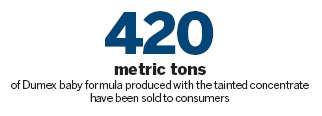

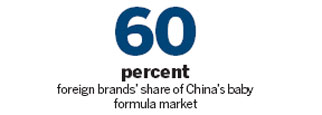
(China Daily USA 08/06/2013 page1)
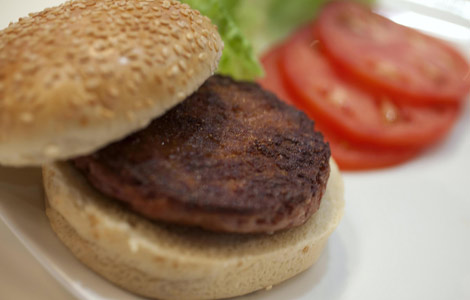
 First taste of test-tube burger close to meat
First taste of test-tube burger close to meat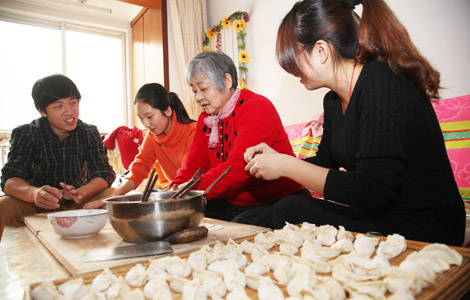
 Govt urged to take care of parents who lose child
Govt urged to take care of parents who lose child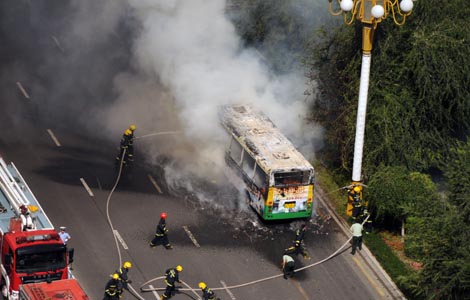
 1 dead, dozens injured in Urumqi bus fire
1 dead, dozens injured in Urumqi bus fire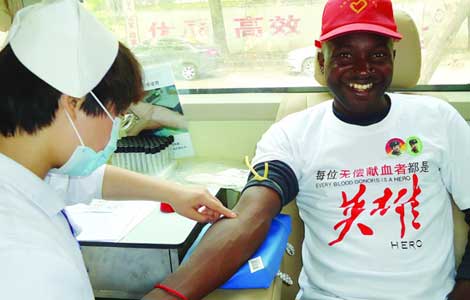
 Lei Feng's African brother
Lei Feng's African brother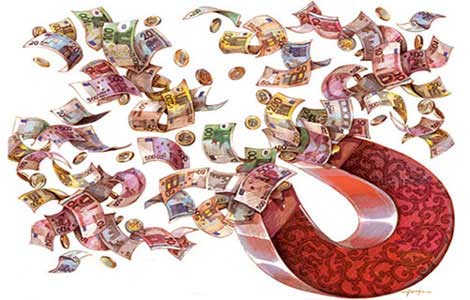
 EU SMEs target niche markets in China
EU SMEs target niche markets in China
 British couple caring for special children
British couple caring for special children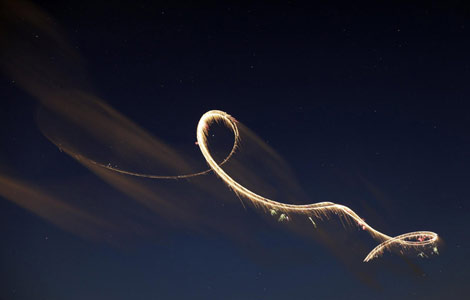
 Fly for adventure at US air show
Fly for adventure at US air show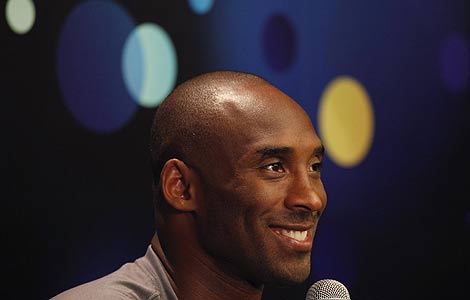
 Kobe Byrant meets fans in Shenzhen
Kobe Byrant meets fans in Shenzhen
Most Viewed
Editor's Picks

|

|

|

|

|

|
Today's Top News
Dialogue defuses EU, China solar case
Drifting left, Asian American voters still back John Liu
Beijing sincere on S China Sea Code of Conduct
Washington Post sold to Amazon's founder
Fonterra says sorry for 'anxiety'
Obesity rate on the increase
Detroit Symphony brings China to NYC
Service sector drives up growth
US Weekly

|

|
